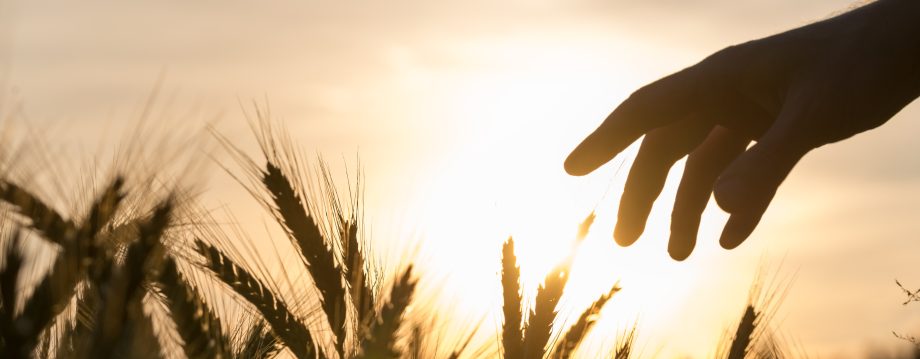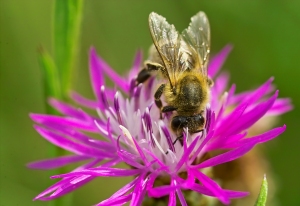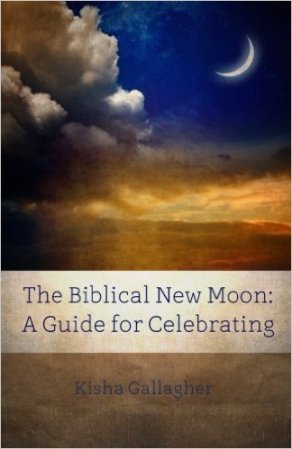Now Deborah, a prophetess, the wife of Lappidot, was judging Israel at that time. (Jdg. 4:4)
The Flaming Bee

The fourth judge of Israel was Deborah, a woman of flames/torches/lamps/lightning.[1] This is according to the bolded phrase above when viewed in the Hebrew (eshet lappidot). I find it captivating that the Hebrew uses such fiery connotations when it presents this unique woman in the Bible. All this imagery is lost and falls flat with the transliterated word Lappidot for those that do not know Hebrew. Blazing torches and fire brands are much more exciting and unpredictable – another reason I love the holy tongue! Have you ever thought of Deborah as fiery? This is how the Bible describes her. Not only that, but she was a prophetess and a judge. Talk about a woman with weighty responsibility! I even imagine her with flaming red locks to accompany her “sparky” introduction.
Lappidot is usually designated as Deborah’s husband in most translations. But the Hebrew phrase eshet lappidot could easily be rendered as “Woman of Torches.” This has led some scholars[2] to conclude that this phrase is descriptive of Deborah’s character, or that it refers to her occupation as a wick maker. The latter is particularly interesting as it denotes that she was tasked with providing the wicks that kept the eternal flames of the holy menorah burning. Other Jewish scholars think this phrase connects Deborah to Barak, for his name actually means “lightning.”[3] The inference is that Barak was her husband. No matter which way you slice this pie, Deborah is connected with fire and lights.
The Palm of Judgment
She used to sit under the palm tree of Deborah between Ramah and Bethel in the hill country of Ephraim; and the sons of Israel came up to her for judgment. (Jdg 4:5)
 As a judge, Deborah not only had judicial power, but she commanded the military. This was the function of Israel’s judges. I believe one reason that Deborah is connected to fire and flames is her ranking number among Israel’s judges. As the fourth judge of Israel, Deborah was unique in several ways. She is the only judge of Israel that was female. She was also the only judge to have a dual role as a prophet (aside from Samuel), and she was the only judge that was cast in a totally positive light in the narrative. In fact, the judges succeeding her are depicted with a decline in virtue until Samuel (the last judge) was raised up.[4]
As a judge, Deborah not only had judicial power, but she commanded the military. This was the function of Israel’s judges. I believe one reason that Deborah is connected to fire and flames is her ranking number among Israel’s judges. As the fourth judge of Israel, Deborah was unique in several ways. She is the only judge of Israel that was female. She was also the only judge to have a dual role as a prophet (aside from Samuel), and she was the only judge that was cast in a totally positive light in the narrative. In fact, the judges succeeding her are depicted with a decline in virtue until Samuel (the last judge) was raised up.[4]
Amazingly, I have read and heard some teachers diminish the “judging” aspect of Deborah because she was a female. Apparently, to maintain continuity in their theology, they must regulate the actual role and function of this female prophet and judge. (She wasn’t really making Torah judgments over men, was she?) This not only requires some theological gymnastics, but a stubborn refusal to allow the Word to speak literally. Those less persistent in their preconceived notions grant that she only held this position because there wasn’t a man willing to step up and fulfill this role, but that isn’t found, or even hinted at, in the text.
In Part I, we saw how Rebekah’s nurse Deborah was associated with a tree (etz) and here there is palm tree associated with Deborah the Judge. A judge gives counsel (etzah), which is the feminine form of the word for tree (etz). Do you remember where the nurse Deborah was buried? It was in Bethel under an oak tree. Notice that the judge Deborah sits in the seat of judgment and counsel not very far from her predecessor’s grave. In fact, many commentators suggest that the palm of Deborah and the oak tree where the Deborah the nurse was buried are one and the same. Either way, these women are connected.
The sons (benai) of Israel came up (aliyah) to her for judgment (mishpat). What sort of judgment calls was Deborah making? Strong’s defines misphat as:
H4941 משׁפּט mishpâṭ From H8199; properly a verdict pronounced judicially, especially a sentence or formal decree of divine law, including the act, the place, the suit, the crime, and the penalty.[5]
It comes from the root shaphat (again defined by Strong’s):
H8199 שׁפט shâphaṭ A primitive root; to judge, that is, pronounce sentence (for or against); by implication to vindicate or punish; by extension to govern; passively to litigate.[6]
These Hebrew words for judgment are used in verses such as these:
Ex. 18:15-16 Moses said to his father-in-law, “Because the people come to me to inquire of God. (16) When they have a dispute, it comes to me, and I judge between a man and his neighbor and make known the statutes of God and His laws.”
Dt. 16:18 “You shall appoint for yourself judges and officers in all your towns which the LORD your God is giving you, according to your tribes, and they shall judge the people with righteous judgment.”
Nothing about these definitions diminishes Deborah’s role as a judge of Israel. She decided cases of Torah law and halachah, as was required of all appointed judges. There is no indication that the men of Israel had any problem with the fact that she was a woman. They neither were shamed by her gender, nor did they fear that she had usurped a male-only position. The Body of Messiah could learn a thing or two from this Biblical example.
Four & the Hidden Woman
I’ve mentioned several times that Deborah was the fourth judge of Israel. This is significant because the number four is indicative of authority and  government. Those of you familiar with The Creation Gospel will pick up the theme immediately. For example, the fourth day of creation is associated with the governing action of the sun, moon, and stars. The fourth son of Jacob, Judah, was given authority to rule over Israel. There are four corners of the altar. Palm branches (associated with Deborah) are one of the four species waved at the four corners of the earth during Sukkot. The fourth commandment is to keep Shabbat. The fourth feast is Shavuot (Pentecost). The fourth disciple called by Yeshua was John, and so on.
government. Those of you familiar with The Creation Gospel will pick up the theme immediately. For example, the fourth day of creation is associated with the governing action of the sun, moon, and stars. The fourth son of Jacob, Judah, was given authority to rule over Israel. There are four corners of the altar. Palm branches (associated with Deborah) are one of the four species waved at the four corners of the earth during Sukkot. The fourth commandment is to keep Shabbat. The fourth feast is Shavuot (Pentecost). The fourth disciple called by Yeshua was John, and so on.
Essentially, four is similar to seven, or the whole, but with an emphasis on government. This can be visualized if you imagine a seven branched menorah (lampstand) folded in half. The center stem is not only the source for the six outer branches, but it is also the hinge on which the others hang. In the folded menorah, you distinctly see four stems instead of seven, yet the whole is still present. (You can learn all about this by studying The Creation Gospel model by Dr. Hollisa Alewine)
The governing aspect of the number four is also portrayed in Deborah’s prophetic song that comprises the whole of chapter five. Before Deborah “rose up” there was disorder and strife in Israel (vs.6-11). Apparently, this is why Adonai chose to raise up a “mother” in Israel. Deborah realizes the significance of her role in bringing unity and order to Israel. Do you remember the root and meaning of Deborah from Part I? Truly her name is indicative of her persona and character as one who brings order to disorder. This IS what the Word, davar, of Adonai does, which is the root of her name. Deborah’s association with the number four only magnifies this truth.
She Speaks
 The song of Deborah demonstrates her gift of prophecy. There can be no doubt that Deborah’s primary weapon was words as testified by her name (lit. dibberah: “she speaks”). I cannot help but to wonder what would have happened if she had been silenced or ignored due to her gender. Deborah, a woman on fire with the Word, spoke! Her words brought righteous judgment and order to chaos. The “ways” of the people were crooked and the “watering” places became a place of division and war…UNTIL Deborah arose!
The song of Deborah demonstrates her gift of prophecy. There can be no doubt that Deborah’s primary weapon was words as testified by her name (lit. dibberah: “she speaks”). I cannot help but to wonder what would have happened if she had been silenced or ignored due to her gender. Deborah, a woman on fire with the Word, spoke! Her words brought righteous judgment and order to chaos. The “ways” of the people were crooked and the “watering” places became a place of division and war…UNTIL Deborah arose!
Jdg 5:6-11 “In the days of Shamgar the son of Anath, In the days of Jael, the highways were deserted, and travelers went by roundabout ways. (7) The peasantry ceased, they ceased in Israel, Until I, Deborah, arose, Until I arose, a mother in Israel. (8) New gods were chosen; then war was in the gates. Not a shield or a spear was seen among forty thousand in Israel. (9) My heart goes out to the commanders of Israel, the volunteers among the people; Bless the LORD! (10) You who ride on white donkeys, You who sit on rich carpets, and you who travel on the road – sing! (11) At the sound of those who divide flocks among the watering places, there they shall recount the righteous deeds of the LORD, the righteous deeds for His peasantry in Israel. Then the people of the LORD went down to the gates.”
Deborah not only “roused” herself, but calls the remnant of the faithful in Israel to arise and battle for truth and the God of Truth, YHWH. As usual, the call is to “Wake Up!”
Jdg. 5:12-13 “Awake, awake, Deborah; Awake, awake, sing a song! Arise, Barak, and take away your captives, O son of Abinoam. (13) Then survivors came down to the nobles; the people of the LORD came down to me as warriors.”
Does this not remind you of another prophecy in the Torah regarding Israel?
Num. 24:8-9 “Elohim who has brought him out of Egypt is for him like the lofty horns of the wild ox; he shall eat up the nations that are his foes, and shall break their bones in pieces, and shall pierce them through with his arrows. (9) He has crouched; he has lain down like a lion, and like a lioness; who shall rouse him up? Blessed is everyone that blesses you, and cursed is everyone that curses you.” (HRB)
Dr. Tikva Frymer Kensky beautifully illustrates how the alternate meaning of Deborah, a bee, ties all of this together:
Like the queen bee, she raises up the swarm for battle, sending out the drones to protect the hive and conquer new territory.[7]
The Song
Deborah’s song describes three particular women. The first, of course, is Deborah herself. I believe we already have a good understanding of the fact that she clearly represents both the activity of the Holy Spirit and of the righteous assembly of Adonai. The second woman is Yael (Jael). It was by her hand that King Sisera met his demise. Yael means “to ascend” and “mountain goat.” An ideal wife will be to her husband a fountain (notice the woman/water imagery) and a graceful hind (mountain goat).
Pr. 5:18-20 “Let your fountain be blessed, and rejoice in the wife of your youth. (19) As a loving hind and a graceful doe, let her breasts satisfy you at all times; be exhilarated always with her love. (20) For why should you, my son, be exhilarated with an adulteress and embrace the bosom of a foreigner?”
Since Proverbs 31 depicts the Eshet Chayil or Woman of Valor as a Warrior,[8] it’s not surprising that a woman named “Yael” was given the honor of defeating Israel’s enemy. She is a fountain of living waters[9] to her husband and a mother to Israel (like Deborah). She was a warrior woman like the women who served at the doorway to the Tent of Meeting.[10] And her bravery ascends up to heaven like the sweet aroma of the goat Olah sacrifice.
 It is for these reasons that I find it intriguing that Sisera asks Yael for water, but she instead gives him milk. Ponder this. A woman is a picture of life giving waters; Yael has anything but life in mind for Sisera. Like a baby, she gives him milk and he falls asleep between her thighs. This is when she hammers a tent peg through his temple. Again, with the “tent peg,” we see the imagery of a woman… she builds her house. Obviously, Sisera is a threat to the expanding of her tent or home. Yael may appear to be acting like a harlot, but in reality she is a righteous warrior of her home and for the people of Israel.
It is for these reasons that I find it intriguing that Sisera asks Yael for water, but she instead gives him milk. Ponder this. A woman is a picture of life giving waters; Yael has anything but life in mind for Sisera. Like a baby, she gives him milk and he falls asleep between her thighs. This is when she hammers a tent peg through his temple. Again, with the “tent peg,” we see the imagery of a woman… she builds her house. Obviously, Sisera is a threat to the expanding of her tent or home. Yael may appear to be acting like a harlot, but in reality she is a righteous warrior of her home and for the people of Israel.
The third woman in Deborah’s song illustrates the other side of the coin. Remember, we are constantly shown the dichotomy of a righteous woman and a harlot in the Scriptures. They call to the same people, sit in the same places, and often wear similar colors. It is our job to discern which one we are dealing with, or which one we are acting like (this is true for men and women). Yael appeared to be a harlot by calling Sisera into her tent, but in the end, she is revealed to be righteous.
The unnamed mother of Sisera is the third woman mentioned, and she is depicted as anxiously looking (seeing/false prophecy) for her son to return home with the spoils of war. Notice that part of the expected “spoil” is the daughters of Israel. The Hebrew term used for these Israeli maidens is racham (wombs)![11] The enemy, the harlot, and the dragon desire to devour the offspring of the (righteous) woman.[12] Moreover, the other spoils of war mentioned are dyed and embroidered works. These “works” are associated with the righteous women of Israel who provided them to cover and beautify the Tabernacle or Dwelling Place of Adonai (Ex. 35:25, Pr. 31:22). The enemy wants to capture, destroy, and rape the daughters and prevent or pervert their righteous acts.
Can you see the poetic justice between Yael and Sisera’s mother? Sisera desires to steal the “wombs” of Israel, but instead he dies between the thighs of the righteous woman (Yael). If you aren’t paying close attention, you just might miss this point. Or worse, you may misinterpret the actions of Yael and accuse of her of unsavory character. While this story makes the actions of the righteous woman more clear, other stories utilizing this same dichotomy are more subtle. For example, consider Tamar, Rahab, or Ruth. Each of their actions could be misconstrued if you’re not reading carefully.
But why all this emphasis on the women? In the eyes of Adonai, His people are the daughter, the sister, the wife, the bride, and the woman. If our view of natural women is skewed, then our prophetic outlook on the whole Body will also be out of kilter. So in that sense, when we look into the narratives and lives of the women, we are really investigating the sons of Adonai too. The Hidden Ones (both men & women) are revealed in the Woman. Look for her!
In the natural, women have been oppressed throughout secular and religious history. I believe this is a picture of what’s happening in the spiritual realm as well. It is a woman that both men and women are compared to in the Scriptures. When we liberate and restore natural women, the WHOLE (spiritual) Body is restored. If the enemy can steal the wombs of Israel, we are weakened and the tent fails to expand. To produce LIFE, it takes both a man and a woman. May the Deborah’s in Adonai’s camp ignite the hive to proclaim Truth and battle all the Sisera’s of our day.
Footnotes:
[1] The phrase (the wifeH802 of Lapidoth,H3941 )is the following two Hebrew words respectively defined by Strong’s:
H802 ish-shaw’, naw-sheem’ The first form is the feminine of H376 or H582; the second form is an irregular plural; a woman (used in the same wide sense as H582).: – [adulter]ess, each, every, female, X many, + none, one, + together, wife, woman.
H3941 lap-pee-doth’ Feminine plural of H3940; Lappidoth, From an unused root probably meaning to shine; a flambeau, lamp or flame: – (fire-) brand, (burning) lamp, lightning, torch, the husband of Deborah: – Lappidoth.
[2] Eshet lapidot could be translated “wife of Lapidot,” but it also means “woman of torches.” Lapidot, “torches,” comes where we would ordinarily expect a husband’s name, but it is a strange‑sounding name for a man and, moreover, does not have the standard patronymic “son of.” (Dr. Frymer-Kensky) http://www.myjewishlearning.com/texts/Bible/Prophets/Former_Prophets/Book_of_Judges/Deborah.shtml?p=1
[3] http://biblehub.com/topical/l/lappidoth.htm
[4] When looking into the number of Israel’s judges, there is not a unanimous opinion on how many there actually were. The number usually falls between 12 and 15. This is due to the fact that some “rulers” like Abimelech aren’t directly referred to as a “judge”, but ruled Israel all the same. No matter whom you include in your count, Deborah is the fourth in order.
[5] Emphasis mine. Definition shortened in order for easier reading.
[6] See footnote 2.
[7]http://www.myjewishlearning.com/texts/Bible/Prophets/Former_Prophets/Book_of_Judges/Deborah_Prn.shtml
[8] See The Biblical Role of Women Part IV.
[9] See The Cup of Miriam Part III.
[10] See The Mirror Waters and the Gatekeepers.
[11] Jdg. 5:30 ‘Are they not finding, are they not dividing the spoil? A maiden (racham), two maidens (racham) for every warrior; To Sisera a spoil of dyed work, A spoil of dyed work embroidered, Dyed work of double embroidery on the neck of the spoiler?’
[12] Rev 12:4 And his tail *swept away a third of the stars of heaven and threw them to the earth. And the dragon stood before the woman who was about to give birth, so that when she gave birth he might devour her child. Rev 12:17 So the dragon was enraged with the woman, and went off to make war with the rest of her children, who keep the commandments of God and hold to the testimony of Jesus.








